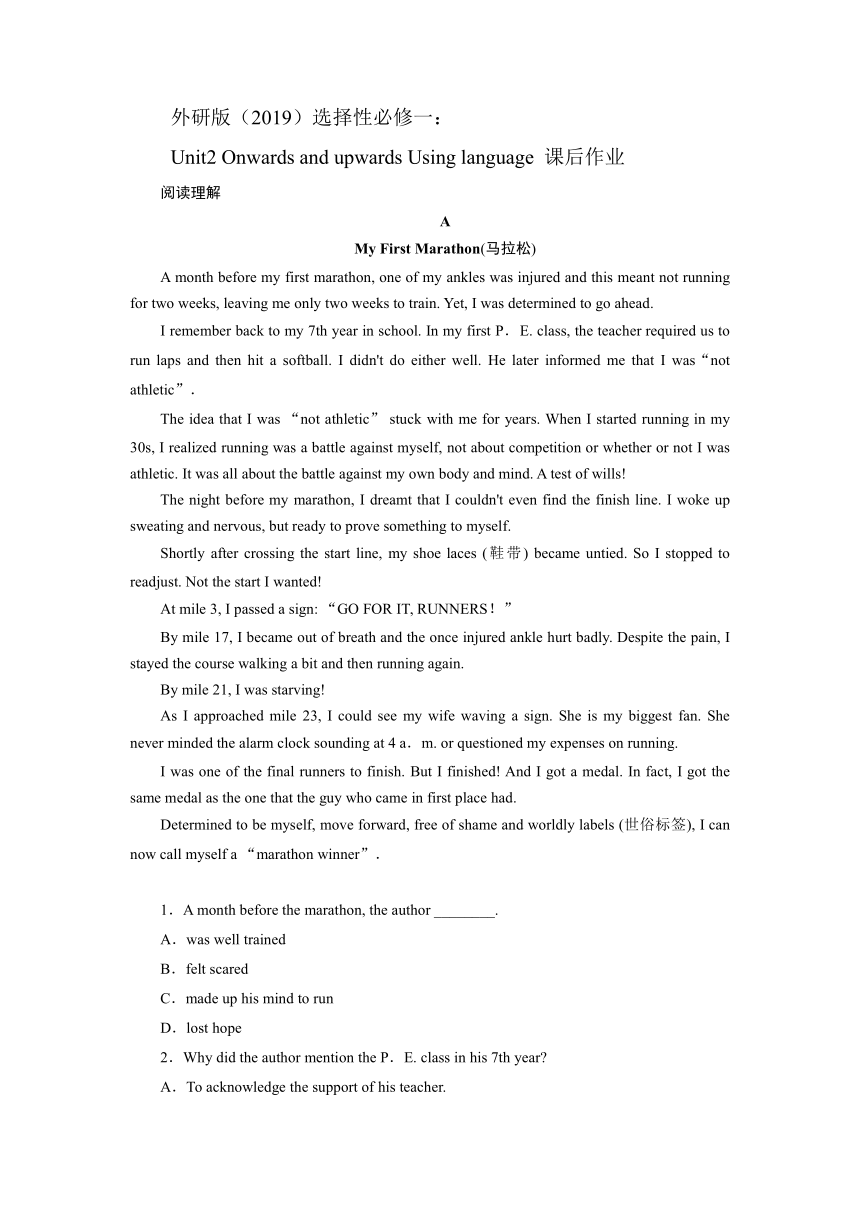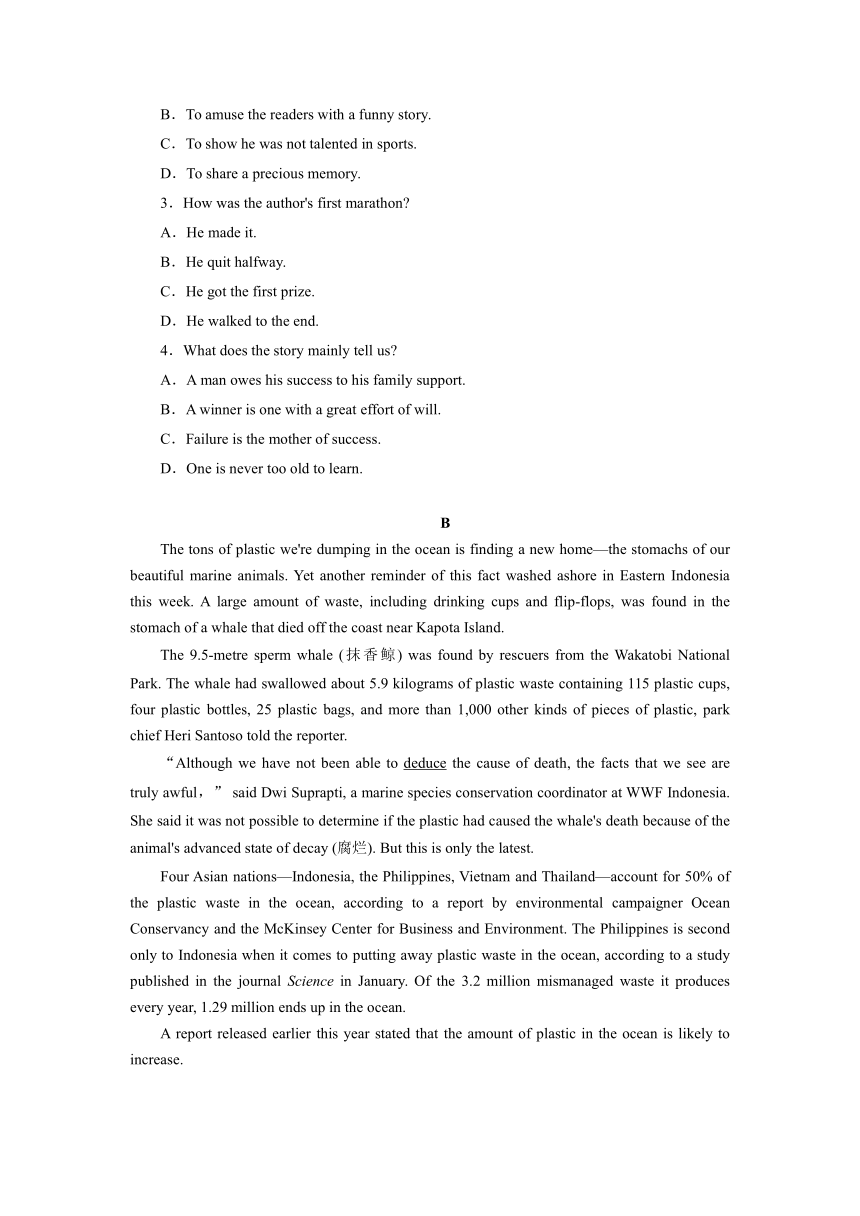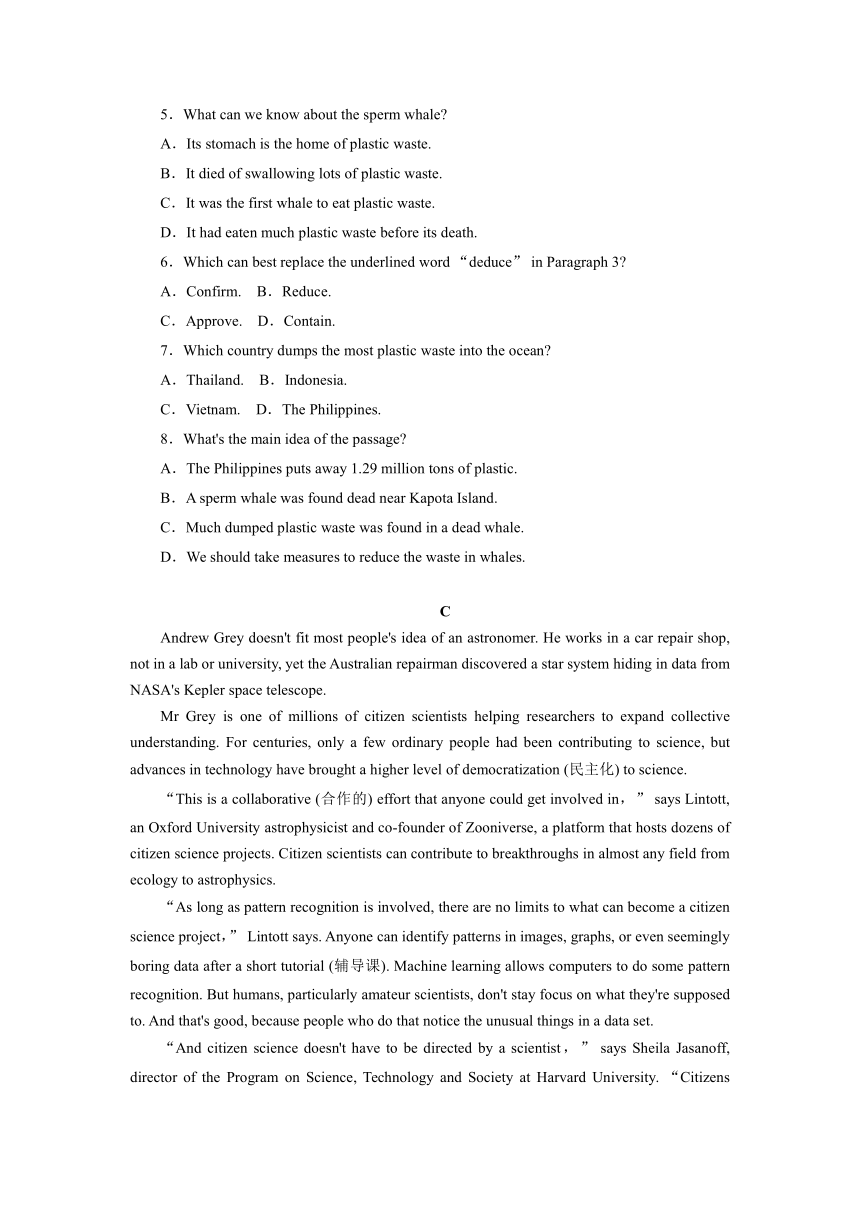外研版(2019)选择性必修一:Unit2 Onwards and upwards Using language 课后作业(含答案)
文档属性
| 名称 | 外研版(2019)选择性必修一:Unit2 Onwards and upwards Using language 课后作业(含答案) |  | |
| 格式 | doc | ||
| 文件大小 | 51.0KB | ||
| 资源类型 | 教案 | ||
| 版本资源 | 外研版(2019) | ||
| 科目 | 英语 | ||
| 更新时间 | 2021-09-06 15:33:20 | ||
图片预览



文档简介
外研版(2019)选择性必修一:
Unit2
Onwards
and
upwards
Using
language
课后作业
阅读理解
A
My
First
Marathon(马拉松)
A
month
before
my
first
marathon,
one
of
my
ankles
was
injured
and
this
meant
not
running
for
two
weeks,
leaving
me
only
two
weeks
to
train.
Yet,
I
was
determined
to
go
ahead.
I
remember
back
to
my
7th
year
in
school.
In
my
first
P.E.
class,
the
teacher
required
us
to
run
laps
and
then
hit
a
softball.
I
didn't
do
either
well.
He
later
informed
me
that
I
was“not
athletic”.
The
idea
that
I
was
“not
athletic”
stuck
with
me
for
years.
When
I
started
running
in
my
30s,
I
realized
running
was
a
battle
against
myself,
not
about
competition
or
whether
or
not
I
was
athletic.
It
was
all
about
the
battle
against
my
own
body
and
mind.
A
test
of
wills!
The
night
before
my
marathon,
I
dreamt
that
I
couldn't
even
find
the
finish
line.
I
woke
up
sweating
and
nervous,
but
ready
to
prove
something
to
myself.
Shortly
after
crossing
the
start
line,
my
shoe
laces
(鞋带)
became
untied.
So
I
stopped
to
readjust.
Not
the
start
I
wanted!
At
mile
3,
I
passed
a
sign:
“GO
FOR
IT,
RUNNERS!”
By
mile
17,
I
became
out
of
breath
and
the
once
injured
ankle
hurt
badly.
Despite
the
pain,
I
stayed
the
course
walking
a
bit
and
then
running
again.
By
mile
21,
I
was
starving!
As
I
approached
mile
23,
I
could
see
my
wife
waving
a
sign.
She
is
my
biggest
fan.
She
never
minded
the
alarm
clock
sounding
at
4
a.m.
or
questioned
my
expenses
on
running.
I
was
one
of
the
final
runners
to
finish.
But
I
finished!
And
I
got
a
medal.
In
fact,
I
got
the
same
medal
as
the
one
that
the
guy
who
came
in
first
place
had.
Determined
to
be
myself,
move
forward,
free
of
shame
and
worldly
labels
(世俗标签),
I
can
now
call
myself
a
“marathon
winner”.
1.A
month
before
the
marathon,
the
author
________.
A.was
well
trained
B.felt
scared
C.made
up
his
mind
to
run
D.lost
hope
2.Why
did
the
author
mention
the
P.E.
class
in
his
7th
year?
A.To
acknowledge
the
support
of
his
teacher.
B.To
amuse
the
readers
with
a
funny
story.
C.To
show
he
was
not
talented
in
sports.
D.To
share
a
precious
memory.
3.How
was
the
author's
first
marathon?
A.He
made
it.
B.He
quit
halfway.
C.He
got
the
first
prize.
D.He
walked
to
the
end.
4.What
does
the
story
mainly
tell
us?
A.A
man
owes
his
success
to
his
family
support.
B.A
winner
is
one
with
a
great
effort
of
will.
C.Failure
is
the
mother
of
success.
D.One
is
never
too
old
to
learn.
B
The
tons
of
plastic
we're
dumping
in
the
ocean
is
finding
a
new
home—the
stomachs
of
our
beautiful
marine
animals.
Yet
another
reminder
of
this
fact
washed
ashore
in
Eastern
Indonesia
this
week.
A
large
amount
of
waste,
including
drinking
cups
and
flip?flops,
was
found
in
the
stomach
of
a
whale
that
died
off
the
coast
near
Kapota
Island.
The
9.5?metre
sperm
whale
(抹香鲸)
was
found
by
rescuers
from
the
Wakatobi
National
Park.
The
whale
had
swallowed
about
5.9
kilograms
of
plastic
waste
containing
115
plastic
cups,
four
plastic
bottles,
25
plastic
bags,
and
more
than
1,000
other
kinds
of
pieces
of
plastic,
park
chief
Heri
Santoso
told
the
reporter.
“Although
we
have
not
been
able
to
deduce
the
cause
of
death,
the
facts
that
we
see
are
truly
awful,”
said
Dwi
Suprapti,
a
marine
species
conservation
coordinator
at
WWF
Indonesia.
She
said
it
was
not
possible
to
determine
if
the
plastic
had
caused
the
whale's
death
because
of
the
animal's
advanced
state
of
decay
(腐烂).
But
this
is
only
the
latest.
Four
Asian
nations—Indonesia,
the
Philippines,
Vietnam
and
Thailand—account
for
50%
of
the
plastic
waste
in
the
ocean,
according
to
a
report
by
environmental
campaigner
Ocean
Conservancy
and
the
McKinsey
Center
for
Business
and
Environment.
The
Philippines
is
second
only
to
Indonesia
when
it
comes
to
putting
away
plastic
waste
in
the
ocean,
according
to
a
study
published
in
the
journal
Science
in
January.
Of
the
3.2
million
mismanaged
waste
it
produces
every
year,
1.29
million
ends
up
in
the
ocean.
A
report
released
earlier
this
year
stated
that
the
amount
of
plastic
in
the
ocean
is
likely
to
increase.
5.What
can
we
know
about
the
sperm
whale?
A.Its
stomach
is
the
home
of
plastic
waste.
B.It
died
of
swallowing
lots
of
plastic
waste.
C.It
was
the
first
whale
to
eat
plastic
waste.
D.It
had
eaten
much
plastic
waste
before
its
death.
6.Which
can
best
replace
the
underlined
word
“deduce”
in
Paragraph
3?
A.Confirm.
B.Reduce.
C.Approve.
D.Contain.
7.Which
country
dumps
the
most
plastic
waste
into
the
ocean?
A.Thailand.
B.Indonesia.
C.Vietnam.
D.The
Philippines.
8.What's
the
main
idea
of
the
passage?
A.The
Philippines
puts
away
1.29
million
tons
of
plastic.
B.A
sperm
whale
was
found
dead
near
Kapota
Island.
C.Much
dumped
plastic
waste
was
found
in
a
dead
whale.
D.We
should
take
measures
to
reduce
the
waste
in
whales.
C
Andrew
Grey
doesn't
fit
most
people's
idea
of
an
astronomer.
He
works
in
a
car
repair
shop,
not
in
a
lab
or
university,
yet
the
Australian
repairman
discovered
a
star
system
hiding
in
data
from
NASA's
Kepler
space
telescope.
Mr
Grey
is
one
of
millions
of
citizen
scientists
helping
researchers
to
expand
collective
understanding.
For
centuries,
only
a
few
ordinary
people
had
been
contributing
to
science,
but
advances
in
technology
have
brought
a
higher
level
of
democratization
(民主化)
to
science.
“This
is
a
collaborative
(合作的)
effort
that
anyone
could
get
involved
in,”
says
Lintott,
an
Oxford
University
astrophysicist
and
co?founder
of
Zooniverse,
a
platform
that
hosts
dozens
of
citizen
science
projects.
Citizen
scientists
can
contribute
to
breakthroughs
in
almost
any
field
from
ecology
to
astrophysics.
“As
long
as
pattern
recognition
is
involved,
there
are
no
limits
to
what
can
become
a
citizen
science
project,”
Lintott
says.
Anyone
can
identify
patterns
in
images,
graphs,
or
even
seemingly
boring
data
after
a
short
tutorial
(辅导课).
Machine
learning
allows
computers
to
do
some
pattern
recognition.
But
humans,
particularly
amateur
scientists,
don't
stay
focus
on
what
they're
supposed
to.
And
that's
good,
because
people
who
do
that
notice
the
unusual
things
in
a
data
set.
“And
citizen
science
doesn't
have
to
be
directed
by
a
scientist,”
says
Sheila
Jasanoff,
director
of
the
Program
on
Science,
Technology
and
Society
at
Harvard
University.
“Citizens
producing
knowledge
in
places
where
official
organs
have
failed
them
can
also
be
citizen
scientists,”
she
says.
That's
what
happened
in
Flint,
Michigan,
when
a
local
mother
started
drinking
water
tests
that
caused
a
broader
investigation
of
lead
levels.
Citizen?powered
research
is
as
old
as
scientific
inquiry.
For
centuries
before
science
became
professionalized,
regular
people
looked
for
patterns
in
the
world
around
them.
Despite
a
lot
of
advanced
equipment
and
computer
models,
scientists
still
welcome
help
from
ordinary
people.
As
a
professional
scientist
himself.
Lintott
says,
“People
think
that
we're
intelligent,
but
science
is
easy
and
we
need
their
help.”
9.What
made
citizen
scientists
appear?
A.The
high
level
of
science
projects.
B.The
development
of
technology.
C.The
support
of
the
government.
D.The
foundation
of
Zooniverse.
10.What
is
an
advantage
of
humans
in
pattern
recognition
compared
with
machines?
A.Humans
can
identify
patterns
more
swiftly.
B.Hunmans
focus
their
attention
on
data.
C.Humans
can
observe
uncommon
things.
D.Humans
have
stronger
emotions.
11.What
is
Lintott's
attitude
towards
citizen
seience?
A.Favourable.
B.Cautious.
C.Indifferent.
D.Doubtful.
12.What
would
be
the
best
title
of
the
text?
A.Citizen
Scientists
Can
Be
Intelligent
B.Science
Is
Important
to
Everyone
C.Anyone
Can
Be
a
Scientist
D.Science
is
Everywhere
详解答案
阅读理解
A
【语篇解读】 本文为记叙文。“我”虽然没有运动天赋,但是通过坚持不懈的努力,“我”最终完成了自己的第一次马拉松。
1.答案与解析:C 细节理解题。根据文章第一段最后一句Yet,
I
was
determined
to
go
ahead.可知,“我”虽然脚踝受伤,但还是决定去参加马拉松。
2.答案与解析:C 推理判断题。体育课上老师对“我”的评价是not
athletic,这从侧面证明了“我”不具备运动天赋,故选择C项。
3.答案与解析:A 细节理解题。根据文章倒数第二段前两句I
was
one
of
the
final
runners
to
finish.
But
I
finished!可知,“我”完成了第一次马拉松,故选择A项。
4.答案与解析:B 主旨大意题。根据文章最后一段Determined
to
be
myself,
move
forward,
free
of
shame
and
wordly
labels,
I
can
now
call
myself
a“marathon
winner”.可知,这篇文章主要想告诉读者胜利者要具备挑战自我的精神和坚强的意志,故选择B项。
B
【语篇解读】 这是一篇新闻报道。文章讲述了在一头死鲸的胃里发现了大量倾倒的塑料垃圾。
5.答案与解析:D 细节理解题。根据第二段中的“The
whale
had
swallowed
about
5.9
kilograms
of
plastic
waste
containing
115
plastic
cups,
four
plastic
bottles...the
reporter”可知,这头抹香鲸在死前,吞食了很多塑料垃圾。故选D。
6.答案与解析:A 词义猜测题。根据下文中的“She
said
it
was
not
possible
to
determine
if
the
plastic
had
caused
the
whale's
death
because
of
the
animal's
advanced
state
of
decay
(腐烂)”可知,无法确定塑料是否是导致这头鲸死亡的原因,因为它的腐烂已经到了晚期。由此推断出,“Although
we
have
not
been
able
to
deduce
the
cause
of
death,
the
facts
that
we
see
are
truly
awful”的意思是虽然我们还不能证实抹香鲸死亡的原因,但我们看到的事实确实很可怕。“deduce”的意思是“证实”。故选A。
7.答案与解析:B 细节理解题。根据第四段中的“The
Philippines
is
second
only
to
Indonesia
when
it
comes
to
putting
away
plastic
waste
in
the
ocean,
according
to
a
study
published
in
the
journal
Science
in
January”可知,印度尼西亚向海洋倾倒的塑料垃圾最多,菲律宾次之。故选B。
8.答案与解析:C 主旨大意题。结合全文内容可知,文章主要讲了在一头死鲸胃里,发现了大量倾倒的塑料垃圾。故选C。
C
【语篇解读】 本文简述了科技的进步已经为科学带来了更高水平的民主化,科学是任何人都能参与的,每个人都有可能成为科学家。
9.答案与解析:B 细节理解题。根据第二段中的“only
a
few
ordinary
people...
democratization
(民主化)
to
science”可知,科技的进步为科学带来了更高水平的民主化,从而使更多的普通人也能参与科学研究,促成了公民科学家的出现。故选B。
10.答案与解析:C 细节理解题。根据第四段中的最后一句“And
that's
good,
because
people
who
do
that
notice
the
unusual
things
in
a
data
set”可知,在模式识别方面,人类与机器相比,人类的优势在于能够注意到一些不寻常的东西。故选C。
11.答案与解析:A 推理判断题。根据第三段中Lintott表述的科学人人都能参与,第四段他表述的公民科学家有自身的优势和尾段中他说的话“People
think
that
we're
intelligent,
but
science
is
easy
and
we
need
their
help”可推知,Lintott支持公民科学。故选A。
12.答案与解析:C 主旨大意题。文章第一段以表述澳大利亚汽车修理工Andrew
Grey成为公民科学家来引入话题,接着又讲到天体物理学家Lintott和Sheila
Jasanoff对于公民科学的看法,并结合倒数第二段中的“scientists
still
welcome
help
from
ordinary
people”可知,本文主要肯定了公民科学家,表达了任何人都可能成为科学家的观点,故C项最适合作文章标题。
Unit2
Onwards
and
upwards
Using
language
课后作业
阅读理解
A
My
First
Marathon(马拉松)
A
month
before
my
first
marathon,
one
of
my
ankles
was
injured
and
this
meant
not
running
for
two
weeks,
leaving
me
only
two
weeks
to
train.
Yet,
I
was
determined
to
go
ahead.
I
remember
back
to
my
7th
year
in
school.
In
my
first
P.E.
class,
the
teacher
required
us
to
run
laps
and
then
hit
a
softball.
I
didn't
do
either
well.
He
later
informed
me
that
I
was“not
athletic”.
The
idea
that
I
was
“not
athletic”
stuck
with
me
for
years.
When
I
started
running
in
my
30s,
I
realized
running
was
a
battle
against
myself,
not
about
competition
or
whether
or
not
I
was
athletic.
It
was
all
about
the
battle
against
my
own
body
and
mind.
A
test
of
wills!
The
night
before
my
marathon,
I
dreamt
that
I
couldn't
even
find
the
finish
line.
I
woke
up
sweating
and
nervous,
but
ready
to
prove
something
to
myself.
Shortly
after
crossing
the
start
line,
my
shoe
laces
(鞋带)
became
untied.
So
I
stopped
to
readjust.
Not
the
start
I
wanted!
At
mile
3,
I
passed
a
sign:
“GO
FOR
IT,
RUNNERS!”
By
mile
17,
I
became
out
of
breath
and
the
once
injured
ankle
hurt
badly.
Despite
the
pain,
I
stayed
the
course
walking
a
bit
and
then
running
again.
By
mile
21,
I
was
starving!
As
I
approached
mile
23,
I
could
see
my
wife
waving
a
sign.
She
is
my
biggest
fan.
She
never
minded
the
alarm
clock
sounding
at
4
a.m.
or
questioned
my
expenses
on
running.
I
was
one
of
the
final
runners
to
finish.
But
I
finished!
And
I
got
a
medal.
In
fact,
I
got
the
same
medal
as
the
one
that
the
guy
who
came
in
first
place
had.
Determined
to
be
myself,
move
forward,
free
of
shame
and
worldly
labels
(世俗标签),
I
can
now
call
myself
a
“marathon
winner”.
1.A
month
before
the
marathon,
the
author
________.
A.was
well
trained
B.felt
scared
C.made
up
his
mind
to
run
D.lost
hope
2.Why
did
the
author
mention
the
P.E.
class
in
his
7th
year?
A.To
acknowledge
the
support
of
his
teacher.
B.To
amuse
the
readers
with
a
funny
story.
C.To
show
he
was
not
talented
in
sports.
D.To
share
a
precious
memory.
3.How
was
the
author's
first
marathon?
A.He
made
it.
B.He
quit
halfway.
C.He
got
the
first
prize.
D.He
walked
to
the
end.
4.What
does
the
story
mainly
tell
us?
A.A
man
owes
his
success
to
his
family
support.
B.A
winner
is
one
with
a
great
effort
of
will.
C.Failure
is
the
mother
of
success.
D.One
is
never
too
old
to
learn.
B
The
tons
of
plastic
we're
dumping
in
the
ocean
is
finding
a
new
home—the
stomachs
of
our
beautiful
marine
animals.
Yet
another
reminder
of
this
fact
washed
ashore
in
Eastern
Indonesia
this
week.
A
large
amount
of
waste,
including
drinking
cups
and
flip?flops,
was
found
in
the
stomach
of
a
whale
that
died
off
the
coast
near
Kapota
Island.
The
9.5?metre
sperm
whale
(抹香鲸)
was
found
by
rescuers
from
the
Wakatobi
National
Park.
The
whale
had
swallowed
about
5.9
kilograms
of
plastic
waste
containing
115
plastic
cups,
four
plastic
bottles,
25
plastic
bags,
and
more
than
1,000
other
kinds
of
pieces
of
plastic,
park
chief
Heri
Santoso
told
the
reporter.
“Although
we
have
not
been
able
to
deduce
the
cause
of
death,
the
facts
that
we
see
are
truly
awful,”
said
Dwi
Suprapti,
a
marine
species
conservation
coordinator
at
WWF
Indonesia.
She
said
it
was
not
possible
to
determine
if
the
plastic
had
caused
the
whale's
death
because
of
the
animal's
advanced
state
of
decay
(腐烂).
But
this
is
only
the
latest.
Four
Asian
nations—Indonesia,
the
Philippines,
Vietnam
and
Thailand—account
for
50%
of
the
plastic
waste
in
the
ocean,
according
to
a
report
by
environmental
campaigner
Ocean
Conservancy
and
the
McKinsey
Center
for
Business
and
Environment.
The
Philippines
is
second
only
to
Indonesia
when
it
comes
to
putting
away
plastic
waste
in
the
ocean,
according
to
a
study
published
in
the
journal
Science
in
January.
Of
the
3.2
million
mismanaged
waste
it
produces
every
year,
1.29
million
ends
up
in
the
ocean.
A
report
released
earlier
this
year
stated
that
the
amount
of
plastic
in
the
ocean
is
likely
to
increase.
5.What
can
we
know
about
the
sperm
whale?
A.Its
stomach
is
the
home
of
plastic
waste.
B.It
died
of
swallowing
lots
of
plastic
waste.
C.It
was
the
first
whale
to
eat
plastic
waste.
D.It
had
eaten
much
plastic
waste
before
its
death.
6.Which
can
best
replace
the
underlined
word
“deduce”
in
Paragraph
3?
A.Confirm.
B.Reduce.
C.Approve.
D.Contain.
7.Which
country
dumps
the
most
plastic
waste
into
the
ocean?
A.Thailand.
B.Indonesia.
C.Vietnam.
D.The
Philippines.
8.What's
the
main
idea
of
the
passage?
A.The
Philippines
puts
away
1.29
million
tons
of
plastic.
B.A
sperm
whale
was
found
dead
near
Kapota
Island.
C.Much
dumped
plastic
waste
was
found
in
a
dead
whale.
D.We
should
take
measures
to
reduce
the
waste
in
whales.
C
Andrew
Grey
doesn't
fit
most
people's
idea
of
an
astronomer.
He
works
in
a
car
repair
shop,
not
in
a
lab
or
university,
yet
the
Australian
repairman
discovered
a
star
system
hiding
in
data
from
NASA's
Kepler
space
telescope.
Mr
Grey
is
one
of
millions
of
citizen
scientists
helping
researchers
to
expand
collective
understanding.
For
centuries,
only
a
few
ordinary
people
had
been
contributing
to
science,
but
advances
in
technology
have
brought
a
higher
level
of
democratization
(民主化)
to
science.
“This
is
a
collaborative
(合作的)
effort
that
anyone
could
get
involved
in,”
says
Lintott,
an
Oxford
University
astrophysicist
and
co?founder
of
Zooniverse,
a
platform
that
hosts
dozens
of
citizen
science
projects.
Citizen
scientists
can
contribute
to
breakthroughs
in
almost
any
field
from
ecology
to
astrophysics.
“As
long
as
pattern
recognition
is
involved,
there
are
no
limits
to
what
can
become
a
citizen
science
project,”
Lintott
says.
Anyone
can
identify
patterns
in
images,
graphs,
or
even
seemingly
boring
data
after
a
short
tutorial
(辅导课).
Machine
learning
allows
computers
to
do
some
pattern
recognition.
But
humans,
particularly
amateur
scientists,
don't
stay
focus
on
what
they're
supposed
to.
And
that's
good,
because
people
who
do
that
notice
the
unusual
things
in
a
data
set.
“And
citizen
science
doesn't
have
to
be
directed
by
a
scientist,”
says
Sheila
Jasanoff,
director
of
the
Program
on
Science,
Technology
and
Society
at
Harvard
University.
“Citizens
producing
knowledge
in
places
where
official
organs
have
failed
them
can
also
be
citizen
scientists,”
she
says.
That's
what
happened
in
Flint,
Michigan,
when
a
local
mother
started
drinking
water
tests
that
caused
a
broader
investigation
of
lead
levels.
Citizen?powered
research
is
as
old
as
scientific
inquiry.
For
centuries
before
science
became
professionalized,
regular
people
looked
for
patterns
in
the
world
around
them.
Despite
a
lot
of
advanced
equipment
and
computer
models,
scientists
still
welcome
help
from
ordinary
people.
As
a
professional
scientist
himself.
Lintott
says,
“People
think
that
we're
intelligent,
but
science
is
easy
and
we
need
their
help.”
9.What
made
citizen
scientists
appear?
A.The
high
level
of
science
projects.
B.The
development
of
technology.
C.The
support
of
the
government.
D.The
foundation
of
Zooniverse.
10.What
is
an
advantage
of
humans
in
pattern
recognition
compared
with
machines?
A.Humans
can
identify
patterns
more
swiftly.
B.Hunmans
focus
their
attention
on
data.
C.Humans
can
observe
uncommon
things.
D.Humans
have
stronger
emotions.
11.What
is
Lintott's
attitude
towards
citizen
seience?
A.Favourable.
B.Cautious.
C.Indifferent.
D.Doubtful.
12.What
would
be
the
best
title
of
the
text?
A.Citizen
Scientists
Can
Be
Intelligent
B.Science
Is
Important
to
Everyone
C.Anyone
Can
Be
a
Scientist
D.Science
is
Everywhere
详解答案
阅读理解
A
【语篇解读】 本文为记叙文。“我”虽然没有运动天赋,但是通过坚持不懈的努力,“我”最终完成了自己的第一次马拉松。
1.答案与解析:C 细节理解题。根据文章第一段最后一句Yet,
I
was
determined
to
go
ahead.可知,“我”虽然脚踝受伤,但还是决定去参加马拉松。
2.答案与解析:C 推理判断题。体育课上老师对“我”的评价是not
athletic,这从侧面证明了“我”不具备运动天赋,故选择C项。
3.答案与解析:A 细节理解题。根据文章倒数第二段前两句I
was
one
of
the
final
runners
to
finish.
But
I
finished!可知,“我”完成了第一次马拉松,故选择A项。
4.答案与解析:B 主旨大意题。根据文章最后一段Determined
to
be
myself,
move
forward,
free
of
shame
and
wordly
labels,
I
can
now
call
myself
a“marathon
winner”.可知,这篇文章主要想告诉读者胜利者要具备挑战自我的精神和坚强的意志,故选择B项。
B
【语篇解读】 这是一篇新闻报道。文章讲述了在一头死鲸的胃里发现了大量倾倒的塑料垃圾。
5.答案与解析:D 细节理解题。根据第二段中的“The
whale
had
swallowed
about
5.9
kilograms
of
plastic
waste
containing
115
plastic
cups,
four
plastic
bottles...the
reporter”可知,这头抹香鲸在死前,吞食了很多塑料垃圾。故选D。
6.答案与解析:A 词义猜测题。根据下文中的“She
said
it
was
not
possible
to
determine
if
the
plastic
had
caused
the
whale's
death
because
of
the
animal's
advanced
state
of
decay
(腐烂)”可知,无法确定塑料是否是导致这头鲸死亡的原因,因为它的腐烂已经到了晚期。由此推断出,“Although
we
have
not
been
able
to
deduce
the
cause
of
death,
the
facts
that
we
see
are
truly
awful”的意思是虽然我们还不能证实抹香鲸死亡的原因,但我们看到的事实确实很可怕。“deduce”的意思是“证实”。故选A。
7.答案与解析:B 细节理解题。根据第四段中的“The
Philippines
is
second
only
to
Indonesia
when
it
comes
to
putting
away
plastic
waste
in
the
ocean,
according
to
a
study
published
in
the
journal
Science
in
January”可知,印度尼西亚向海洋倾倒的塑料垃圾最多,菲律宾次之。故选B。
8.答案与解析:C 主旨大意题。结合全文内容可知,文章主要讲了在一头死鲸胃里,发现了大量倾倒的塑料垃圾。故选C。
C
【语篇解读】 本文简述了科技的进步已经为科学带来了更高水平的民主化,科学是任何人都能参与的,每个人都有可能成为科学家。
9.答案与解析:B 细节理解题。根据第二段中的“only
a
few
ordinary
people...
democratization
(民主化)
to
science”可知,科技的进步为科学带来了更高水平的民主化,从而使更多的普通人也能参与科学研究,促成了公民科学家的出现。故选B。
10.答案与解析:C 细节理解题。根据第四段中的最后一句“And
that's
good,
because
people
who
do
that
notice
the
unusual
things
in
a
data
set”可知,在模式识别方面,人类与机器相比,人类的优势在于能够注意到一些不寻常的东西。故选C。
11.答案与解析:A 推理判断题。根据第三段中Lintott表述的科学人人都能参与,第四段他表述的公民科学家有自身的优势和尾段中他说的话“People
think
that
we're
intelligent,
but
science
is
easy
and
we
need
their
help”可推知,Lintott支持公民科学。故选A。
12.答案与解析:C 主旨大意题。文章第一段以表述澳大利亚汽车修理工Andrew
Grey成为公民科学家来引入话题,接着又讲到天体物理学家Lintott和Sheila
Jasanoff对于公民科学的看法,并结合倒数第二段中的“scientists
still
welcome
help
from
ordinary
people”可知,本文主要肯定了公民科学家,表达了任何人都可能成为科学家的观点,故C项最适合作文章标题。
